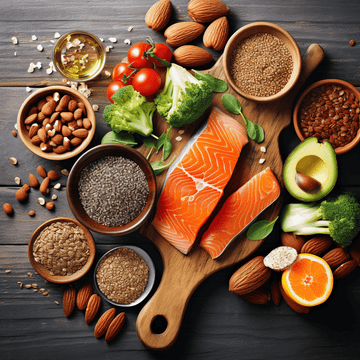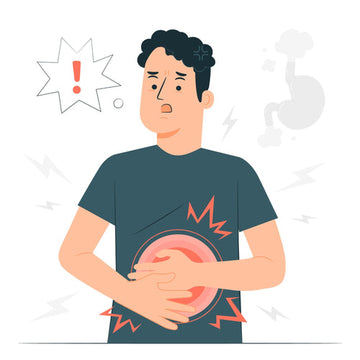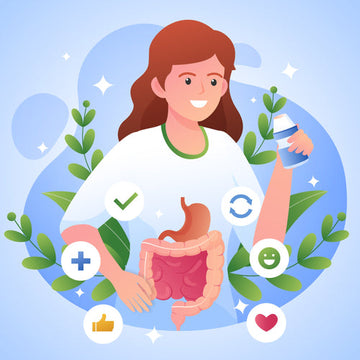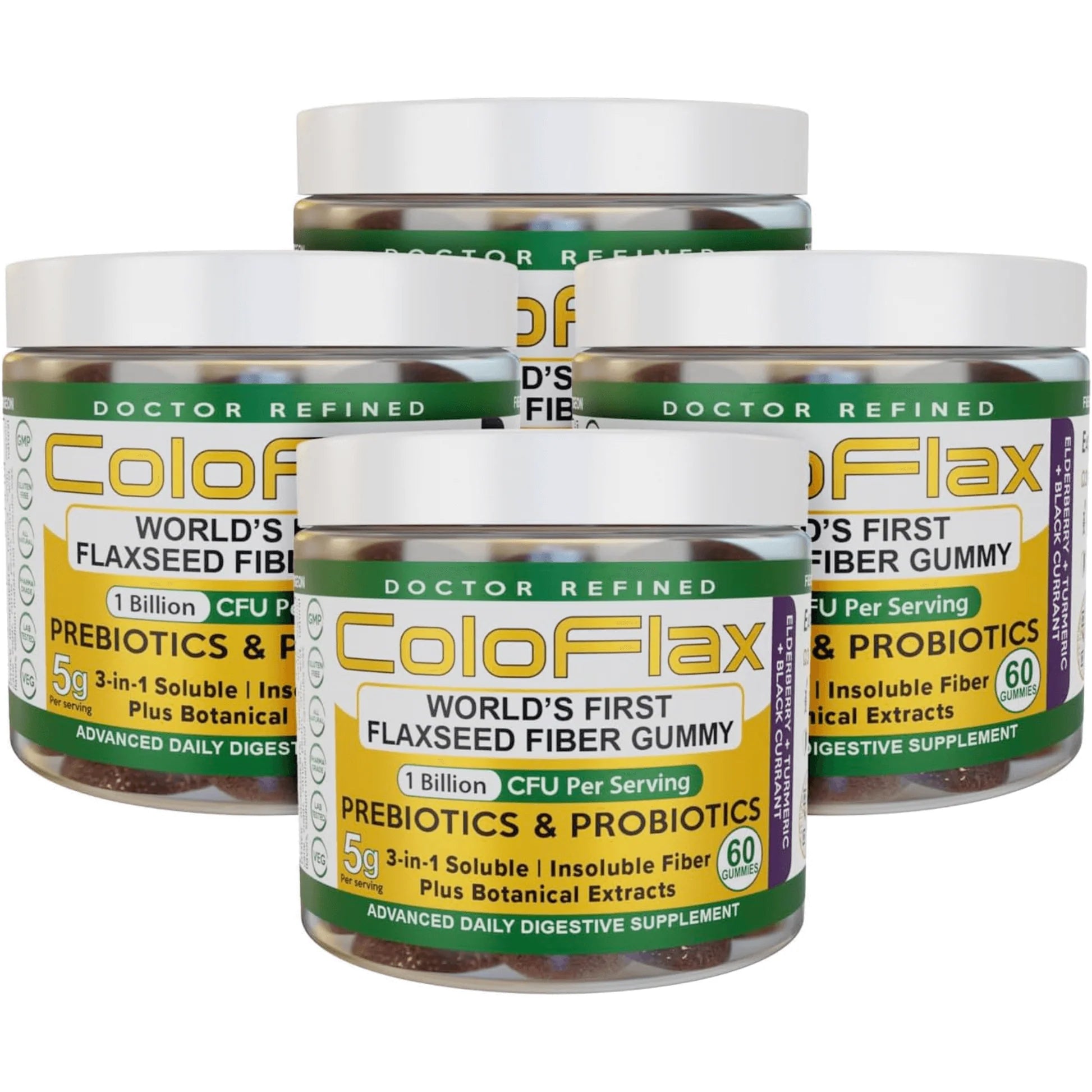We’ve spoken a lot about the importance of fiber in this blog, noting how just 5% of Americans eat enough despite the fact that adequate fiber intake can have a massive impact on everything from digestive to cardiovascular health. We’ve also addressed the differences between soluble and insoluble fiber and noted that you need both types to stay regular and support gut health.
But what about micronutrients? Vitamins and minerals play many roles throughout the body and can aid with everything from skin and hair health to muscle function and cognition. So, which ones do you need to maintain optimal digestive function?
Let’s take a look.
Omega-3 Fatty Acids
As you may have guessed, we’re huge fans of flaxseeds here at ColoBotanix. It’s the main ingredient in our flaxseed fiber gummy (the name gives it away somewhat) and it’s a subject we have covered extensively in this blog (see our guides to flax vs chia and the surprising benefits of flax).
Not only are flaxseeds a great source of fiber and the best source of lignans, but they are also a vegan-friendly way to consume omega-3 fatty acids.
Research suggests that omega-3 fatty acids could provide an array of benefits, including those related to heart and brain health. In recent times, there have been a number of studies highlighting the potential benefits for digestive health. There’s still a lot we don’t know, but it seems that the things that make omega-3 fatty acids so good for the heart and brain could also play a big role in the digestive tract.
Fatty fish like mackerel, trout, and salmon are the best ways to introduce omega-3s to your diet, and you only need 2 or 3 weekly servings to reap the benefits. If you follow a vegan or vegetarian diet, stick with flaxseeds or chia seeds, both of which are excellent sources of omega-3s.
Probiotics
Probiotics are friendly bacteria found in many fermented and “living” foods, including natural yogurt, kefir, sauerkraut, and kimchi. They add to your existing microbiome and help it to thrive.
Studies suggest that probiotics can help to treat diarrhea and digestive issues caused by antibiotics.(1)(2)
They are also often used as complementary therapies for the treatment of symptoms associated with digestive disorders. They are not the panacea that certain yogurt and supplement commercials would have you believe, but they can have a big impact on your digestive health.
If you’re using probiotics, be sure to choose a reputable brand. Probiotics are delicate and can be killed by a number of different things, including stomach acid. High-count probiotics help to negate this issue somewhat, ensuring that enough bacteria reach the gut.
As with everything else, it’s best to consume your probiotics from whole foods where possible. If not, supplements are a good alternative and there is no shortage of them out there.
Prebiotics
Probiotics are the bacteria; prebiotics are the food. They are a type of fiber that help friendly bacteria to thrive. So, get your fill of probiotics to replenish your gut bacteria and then top up with prebiotics to help them do their job.
Some natural sources of prebiotics include almonds, whole grains, cabbage, flaxseeds (there they are again!), and bananas. You don’t need to worry too much about whether or not you’re consuming enough prebiotics. You won’t kill all of your gut bacteria just because you don’t eat the occasional flaxseed or banana. Typically, eating a high-fiber diet is sufficient to keep prebiotic levels high and support intestinal bacteria.
Polyphenols
We mentioned lignans above, noting how they are one of the many beneficial compounds in flaxseeds. Lignans are part of a compound group known as polyphenols, one that also includes flavonoids. There are thousands of types of polyphenols and they have been linked with a wide variety of health benefits.
Many polyphenols have an antioxidant effect on the body, which means they help to combat damage from UV rays and environmental toxins. These miraculous compounds are the reason that foodstuffs like green tea and red wine are so good for you.
They’re also one of the reasons why a diet rich in whole fruits and vegetables is beneficial for your health because the more of these that you eat, the more polyphenols you will consume.
As far as gut health is concerned, studies on polyphenols suggest that they can support the beneficial bacteria in the digestive tract. This is especially true for the polyphenols in grapes, ginger, and pomegranate, but similar benefits may be derived from other phenolic compounds.(3)
L-Glutamine
L-glutamine is an amino acid often used in sports supplements and protein powders. It could play a variety of roles within the body, including in the digestive tract. It is thought that L-glutamine supports the health of intestinal bacteria and encourages them to reproduce and flourish.
It may be even more effective in times of high stress and trauma, such as following an infection or after surgery.
The body produces its own L-glutamine, but it can also be found in foods like beef, eggs, and tofu, as well as a wide range of health and sports supplements.
It should be noted that while moderate doses of L-glutamine are not known to cause any serious adverse reactions, some side effects may arise if very high doses are taken over an extended period of time. These can include constipation and diarrhea. So, if you’re taking multiple supplements, check the L-glutamine of each of them and make sure you’re not inadvertently taking an unnecessarily high dose.
Vitamin D
Vitamin D is needed to keep your bones strong and it also supports immune health, with your gut playing a significant role in this process. Studies suggest that consuming adequate amounts of this vitamin can support your gut microbiome.(4)
The problem with vitamin D is that it’s not readily available in food and supplementation isn’t as effective as it is with other nutrients. The best way to boost your vitamin D levels is to get adequate amounts of sunshine, usually around 30 minutes a day.
It’s an easy target to meet if you live in a hot climate with nearly year-round sunshine, but it’s more challenging if you’re stuck in a cold climate or spend a lot of time indoors. In such cases, consider supplementing with vitamin D and adding fatty fish to your diet.
Zinc
It’s believed that zinc is important for optimal intestinal health, but there’s still a lot that we don’t know about the exact role that it plays. Consuming too little or too much zinc can upset the delicate microbiome, and as discussed above, it’s very important to keep this balanced and aligned.
Zinc deficiency isn’t a massively common issue, but it is seen in people who have issues absorbing nutrients. It’s also common in older people and individuals with gut disorders, the latter of which could be further proof of its importance in the gut.
It’s easy to supplement with zinc, but as with everything else, it’s not the best way. Instead, if you suspect that you might be deficient, consider topping up your zinc levels by consuming seafood like oysters, lobster, and crab, as well as poultry and red meat. Vegans and vegetarians can look to dairy products, breakfast cereals, whole grains, nuts, and beans to get their fill.
Magnesium
Magnesium does some amazing things for your gut health, so make sure you’re getting enough of this mineral in your diet. It helps to relax your muscles, including the smooth muscles in your heart and gut. It can also draw more water into your intestines and thus assist with the smooth passage of waste.
It’s clearly very important, and yet it has been estimated that more than half of Europeans and Americans aren’t getting enough. It’s abundant, so it’s easy to get your fill, but the highest concentrations of magnesium are found in nuts, seeds, leafy greens, and vegetables, and the Western diet tends to overlook these foods in favor of meat, dairy, and processed foods.
Vitamin C
Vitamin C is an antioxidant that can support skin, hair, and immune health. As with vitamin D, it supports immune function in the gut, keeping the microbiome strong and assisting it in the fight against harmful pathogens.(5)
It should be very easy to get enough of this vitamin. Citrus fruits are often regarded as the best source, and they do contain high levels of vitamin C, but the humble kiwi fruit contains even more. Tomatoes, bell peppers, and strawberries are great sources as well.
If you’re averse to fruits and vegetables, consider a vitamin C supplement. They are cheap and widely available. They typically contain mega doses of vitamin C, giving you way more than you need, but it’s a water-soluble vitamin, so the excess will simply be flushed out of your body.
Selenium
Selenium is often overlooked, but it’s an important mineral that supports hormone and metabolic health. More importantly, as far as your gut health is concerned, selenium is a strong antioxidant. It could protect against free radical damage, which may otherwise affect the delicate microbiome and cause inflammation.
Brazil nuts are one of the best sources of selenium, but they are far from the only one. You’ll also find this mineral in oysters, tuna, pork, beef, cottage cheese, eggs, brown rice, chicken, and mushrooms.
There is a lot of interesting research regarding selenium supplements, but these are only needed if you’re not able to get enough of the mineral from your diet.
Summary: Nutrients and Your Gut
As you can see, there are a lot of nutrients that can benefit your digestive health. So, should you start shopping for supplements or creating a detailed diet plan that includes copious amounts of each nutrient?
No, not unless you have a lot of time, money, and patience, as well as the willpower to follow through with such a diet.
Instead, just keep it simple and eat a balanced diet rich in whole foods. As long as you’re eating a lot of fruits and vegetables, you should be getting more than enough of these nutrients. It also helps to drink tea (black and herbal) and add plenty of herbs and spices to your food.
If that’s not enough, consider adding a fiber/gut health supplement to your regime. That’s where ColoFlax comes in. Not only is it high in soluble and insoluble fiber, but it also contains lignans, plant extracts, omega-3 fatty acids, probiotics, and prebiotics. In other words, it contains many of the nutrients outlined above, and it gets these from natural sources.






